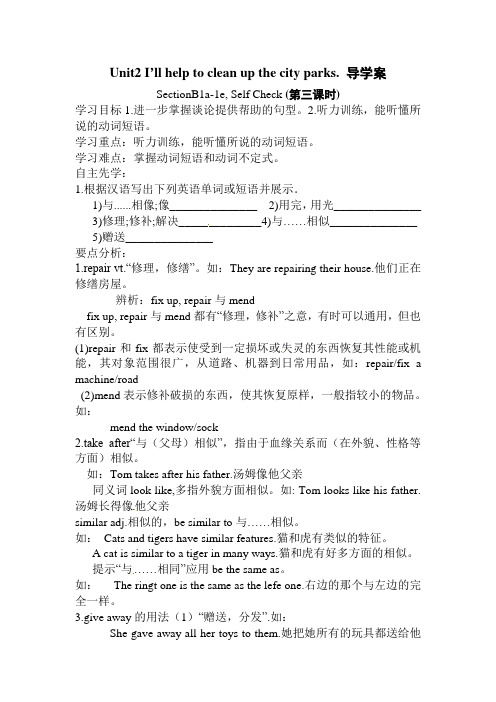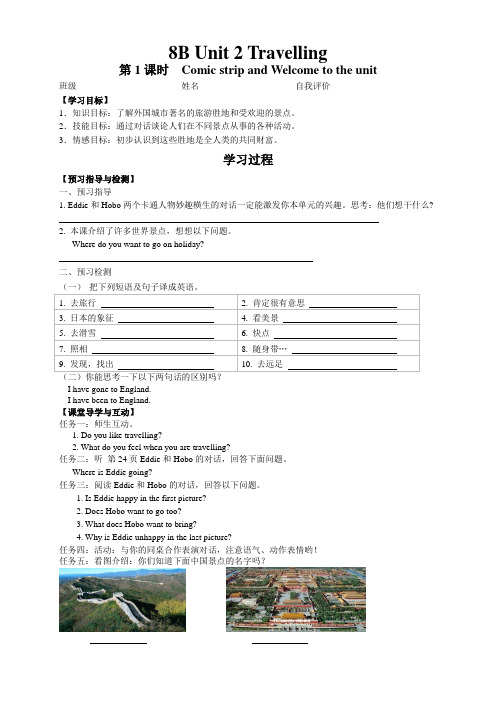Unit2导学案-1
- 格式:docx
- 大小:25.37 KB
- 文档页数:4

Unit2 I’ll help to clean up the city parks.导学案SectionB1a-1e, Self Check (第三课时)学习目标1.进一步掌握谈论提供帮助的句型。
2.听力训练,能听懂所说的动词短语。
学习重点:听力训练,能听懂所说的动词短语。
学习难点:掌握动词短语和动词不定式。
自主先学:1.根据汉语写出下列英语单词或短语并展示.1)与......相像;像_______________ 2)用完,用光_______________3)修理;修补;解决______________4)与……相似_______________5)赠送_______________要点分析:1.repair vt.“修理,修缮”。
如:They are repairing their house.他们正在修缮房屋。
辨析:fix up, repair与mendfix up, repair与mend都有“修理,修补”之意,有时可以通用,但也有区别。
(1)repair和fix都表示使受到一定损坏或失灵的东西恢复其性能或机能,其对象范围很广,从道路、机器到日常用品,如:repair/fix a machine/road(2)mend表示修补破损的东西,使其恢复原样,一般指较小的物品。
如:mend the window/sock2.take after“与(父母)相似”,指由于血缘关系而(在外貌、性格等方面)相似。
如:Tom takes after his father.汤姆像他父亲同义词look like,多指外貌方面相似。
如: Tom looks like his father.汤姆长得像他父亲similar adj.相似的,be similar to与……相似。
如:Cats and tigers have similar features.猫和虎有类似的特征。
A cat is similar to a tiger in many ways.猫和虎有好多方面的相似。

Unit 2 How often do you exercise? Section B 1a-1e导学案第一步:温故知新(3分钟)1、根据句意和首字母提示补全单词,使句子完整、通顺。
(1)、I often surf the I__________ on weekends.(2)、You had better take the medicine t___________ a day.(3)、——What's your favorite TV p__________?——sports news(4)、——How often do you go to the movies?——o__________ a week(5)、The bottle is f__________ of water.2、根据汉语意思完成英语句子,没空一词。
(1)、Tom ______ ______ (几乎从不)watches TV.(2)、They _______ _____ ___________ ___________(正在忙着植树)(3)、John and his friend play football ________ __________(至少)once a week (4)、——How often do you have art lessons?——______ _______ __________(一周两次)(5)、Our teachers usually ____ _______(熬夜)late to work.第二步:明确目标(2分钟)1、.口、笔头掌握以下句型:A:How often do you drink milk? B: I drink milk every day .A: Do you like it ? B: No, but my mother wants me to drink it. She says it’s good for my health.A: How many hours do you sleep every night? B: I sleep six hours .2.熟练掌握以下词汇:milk, coffee, chocolate , drink, health.重难点:1.掌握并能正确使用本课时的重点短语:be good for2.能正确使用how many 对可数名词的复数提问。

8B Unit 2 Travelling第1课时Comic strip and Welcome to the unit班级____________________ 姓名__________________ 自我评价__________________【学习目标】1.知识目标:了解外国城市著名的旅游胜地和受欢迎的景点。
2.技能目标:通过对话谈论人们在不同景点从事的各种活动。
3.情感目标:初步认识到这些胜地是全人类的共同财富。
学习过程【预习指导与检测】一、预习指导1. Eddie和Hobo两个卡通人物妙趣横生的对话一定能激发你本单元的兴趣。
思考:他们想干什么?_______________2. 本课介绍了许多世界景点,想想以下问题。
Where do you want to go on holiday?_______________二、预习检测1. 去旅行2. 肯定很有意思3. 日本的象征4. 看美景5. 去滑雪6. 快点7. 照相8. 随身带…9. 发现,找出10. 去远足I have gone to England.I have been to England.【课堂导学与互动】任务一:师生互动。
1. Do you like travelling?2. What do you feel when you are travelling?任务二:听第24页Eddie和Hobo的对话,回答下面问题。
Where is Eddie going?任务三:阅读Eddie和Hobo的对话,回答以下问题。
1. Is Eddie happy in the first picture?2. Does Hobo want to go too?3. What does Hobo want to bring?4. Why is Eddie unhappy in the last picture?任务四:活动:与你的同桌合作表演对话,注意语气、动作表情哟!任务五:看图介绍:你们知道下面中国景点的名字吗?任务六:看一看写一写,完成第25页Part A部分练习并与你的同桌核对答案。

人教新起点二年级下册英语-Unit 2 Lesson 1导学案一、教学目标知识目标1.学生能够掌握单词 fruit、water、sandwich、juice。
2.学生能够听懂、会说句型 What do you have for breakfast/lunch/dinner?I have …。
3.学生能够运用所学知识,描述自己的早餐、午餐或晚餐。
能力目标1.培养学生的口语交流能力。
2.培养学生的写作能力。
情感目标1.增强学生的英语学习兴趣。
2.培养学生的合作意识。
二、教学内容1.生词:fruit、water、sandwich、juice。
2.句型:What do you have for breakfast/lunch/dinner? I have …。
三、教学步骤步骤一:导入为了让学生更好地理解本课内容,可以通过与学生谈论他们的早餐、午餐或晚餐,引出本课的话题。
老师可以问学生一些问题:•What do you usually have for breakfast/lunch/dinner?•Do you like to eat fruit/sandwich/water/juice?•Why is it important to have a healthy breakfast/lunch/dinner?步骤二:学习生词老师可以用图片、实物或PPT等方式,向学生展示生词,并帮助他们正确发音和理解词义。
1.fruit:水果2.water:水3.sandwich:三明治4.juice:果汁步骤三:学习句型1.What do you have for breakfast?(你早餐吃什么?)2.What do you have for lunch?(你午餐吃什么?)3.What do you have for dinner?(你晚餐吃什么?)4.I have …(我吃…)老师可以用图片或实物,向学生展示早餐、午餐或晚餐的食物,让学生用所学的句型描述自己的餐点。

人教版英语八年级上册第二单元Unit 2 How often do you exercise?Section A (1a-2d)导学案一、预习目标:1、单词:学习这两页的生词。
2、短语过关:学习关于“做某事的频率”的相关短语。
3、语法:频率副词usually\ often\ sometimes \ never\ hardly ever等。
4、句子过关:How often do you exercise? 你多久锻炼一次?\ I often watch TV. 我经常看电视。
\ I never go shopping. 我从不购物。
\ I watch TV every day. 我每天看电视。
5、积累有关书面表达的句子。
预习导学。
(一)、单词突破——根据下面的提示,写出下列单词的意思。
1、housework ____________2、hardly____________3、ever____________4、hardly ever____________5、once_____________6、twice______________7、Internet_____________8、program_____________9、full________________ 10、swing_____________ 11、swing dance ________________单词讲解:1、housework家务劳动、家务事,不可数名词,常用短语do housework,表示“做家务劳动”。
2、hardly几乎不、几乎没有,表示否定。
3、ever在任何时候、从来、曾经,注意和never(绝不)相区别。
4、hardly ever几乎从不;例如:She hardly ever eats junk food. 她几乎从不吃垃圾食品。
5、once一次、曾经,表示次数;例如:once a month一个月一次。
6、twice两次、两倍,表示次数;例如:twice a year一年两次。

Unit 2 Morals and VirtuesReading for Writing【教学目标】1. Read quickly to get main idea; read carefully to get the detailed information about the fable.2. Learn the structure of the reading article and language.3. Write a story comment.4. Learn to correct others’ comments.【教学重难点】1. Write a story comment.2. Use the structure of the reading article and language.【教学过程】Step 1 Lead in—Small talk1. In our traditional culture, there are a lot of good morals and virtues. Can you list some?2. Do you know some fables or stories about them?Step 2 While reading—Task 1Read the fable and answer the following questions:Q1: What does the fable tell us?Q2: What was the king’s idea for teaching an important lesson to his people?Q3: What was the response from most of the people?Q4: What did the young girl think and do when she saw the coins?Step 3 While reading—Task 21.This story presented different pe ople’s emotions and responses when they came across the same problem.2. Have Ss complete the table according to the story and then check the answers. Step 4 Post reading—Pair workHave the Ss discuss the questions and then share their ideas.Q1: What do you think this fable is trying to tell us?Q2: Do you think the king was wise? Why or why not?Q3: Can you think of times in your own life when you felt and acted like the girl or like the other people in the story? Give examples.Step 5 Writing —The OutlineStep 6 WritingVocabulary1.寓言 fable2.等着作某事 wait to do sth./ wait for doing sth.3.负责任 take responsibility for/be responsible for4.成功作某事 succeed in doing sth./be successful in doing sth.5.因……让人印象深刻 have a deep impression on/ upon/ impress on/upon with sth.6.目的 purpose7.鉴于这一原因 for the reasonSentences1.这个寓言是一个关于一位国王古寓言。
Unit 2 Sports and FitnessLesson 1 The Underdog【学习目标】1.掌握并熟练运用本课重点词汇和句型。
2.分析文章中的长难句,判断复合句的类型。
3.理解关系从句的作用及意义。
4.掌握并能正确选用关系代词。
5.在语篇中理解和熟练运用关系从句。
【学习重难点】1.能够在具体语境中熟练运用词汇和句型。
2.如何正确选用关系代词。
3.能够在具体语境中熟练运用关系从句。
【学习过程】一、重点词组1.赢得自己一席之地 __________________________2.跳投__________________________3.把—当作动力__________________________4.成功__________________________5.有为球队效力的强烈愿望__________________________6.与我们的主要对手比赛__________________________7.相互碰撞__________________________8.跟上某人的节奏和速度__________________________9.让某人尝试一下__________________________10.冲向球场__________________________11.鼓掌欢呼__________________________12.打某人肩膀__________________________二、分析长难句,判断复合句类型1. When we weren’t playing on the court which was next to our building, we were watching a game on TV.2. Paul knew that being shorter than other players meant that he had topractise more.3. Paul’s favourite player was Tyrone Bogues, a guy who played for the Charlotte Hornets, although we actually agree that they are both champions.4. The Lions were playing our main competitors, The Bears, a team whose record this season had been perfect.5. He didn’t know he’d soon get the chance that he’d been waiting for.6. Everyone knew Paul had real skills, and was someone who worked really hard and had a strong desire to play for the team.7. And clearly, all the extra hours that he’d spent practising alone paid off.8. He was still usually on the bench, being just a replacement, which was really tough on him.9. Bogues was only 1.6 metres tall, which made him the shortest player ever in the NBA.三、重点词汇ever mean try out compete be tough on pay off1. ever 曾经;(与比较级连用,置于than之后或与最高级连用)比以往任何时候Have you ever visited the great wall?It’s raining harder than ever. 雨下得更大了the shortest player ever in the NBAThis is the best work that you have ever done.=This is your best work ever. 这是你所的最好的工作。
Unit 2 I think that mooncakes are deliciousSection B1 (1a-1d)【学习目标】1.教会学生单词:haunted,ghost,trick,treat,spider2.教会学生通过听力训练获取有效信息,引导学生通过对西方节日的学习,体会西方节日的乐趣。
3.通过学习,了解万圣节的相关庆祝活动。
4. 过对圣诞节的了解,提高语言运用能力。
5. 理解圣诞节精神所在:向周围的人给予爱和送去欢乐。
【重点和难点】【学习重点】重点单词和短语:trick,treat,spider,dress up【学习难点】通过交流表达和听力训练,引导学生通过对西方节日的了解,体会西方节日的乐趣。
【课前预习】一.请根据中文意思写出下列重点单词。
1. 有鬼魂出没的;闹鬼的adj. __________2.花招;把戏n. __________3.款待;招待n.招待;请(客) v.__________二.请认真阅读课文,找出下列重点短语。
4.了解___________________5.装扮___________________三.请用以上重点短语完成下列句子。
6.——你已经了解到哪些有关万圣节前夕的知识?——噢,我知道它是北美的一个很受欢迎的节日,在10月31日。
—What have you_______ _______ Halloween?—Oh,I know it's a _______ _______ in North America and it's on October 31st. 7.——你最喜欢这个节日的什么?——我认为装扮成卡通人物很有趣!—What do you like _______ _______ _______ _______?—I think it's fun to _______ _______ as cartoon characters!四.阅读教材内容完成。
仁爱英语七年级导学案 课题:Unit 2 Topic 1 Section A 1a —2b设计人:马楠楠 时间:2016年10月 课型:听说课标要求: 能运用英语描述人物面貌特征。
学习目标一:能够听懂会说并能够读写下面词汇。
guess 、 have 、 small 、 nose 、 has 、 big 、 eye 、know 、right 、ear 、 hair 、 head 、 face 、 neck 、 mouth 、 round 、 long 、 wide 、学习目标二:能够运用基本的形容词描述人物外貌特征、体格特征。
学习重难点:1. 学会正确使用have/has 表示所属关系时,在不同人称代词引导下的变化形式。
(1)I/You/We/They have long hair. (2)He/She/It has a small nose.一、学习任务一:通过教学图片或课堂真实环境引入人体面部器官的名词。
(达成目标一)(10分钟)词汇闯关二、学习任务二: 对话比拼我最棒(达成学习目标二)(20分钟)1. 学生独立完成2a, 总结动词have/has 的用法。
动词have/has 表示归属,意为“有”,主语为第三人称单数时,用has;其他人称用have 。
2.完成1b 进行自我检测。
3.小组合作练习1C,并展示。
4. 听1a 的录音并完成1b.通过自主学习,完成下列学习。
我不会的词汇或句子有__________________________________________________我写错的词汇或句子有__________________________________________________3、分角色朗读1a 对话.三、教师点拨(5分钟):四、当堂检测(10分钟):一、词汇句子大比拼(检测学习目标一)I 、英汉互译.II 、尝试翻译下列句子.Ⅲ、精挑细选,对话集训。
(检测学习目标二)( )1.—___ you have a big nose ? —Yes ,I___.A. do; doB. Do; doC. Are; isD. Am; do( )2. I____ three English books.A. haveB. hasC. isD. are( )3. She ____ a pen.A. haveB. hasC. isD. are( )4.—Can you spell “ pen ”?—_______A. Yes, I can ’tB. Yes, I canC. No, I canD. Yes, I am.课堂反思:1. 我的收获:_______________________________________________________。
Unit 2 I think that mooncakes are deliciousSection A1 (1a-2d)【学习目标】1. 学习关于谈论节日的常用词汇与句型。
单词:lantern stranger relative短语:kind of put on句型:What a great day!— What do you like best about the Dragon Boat Festival?--- I love the race s. I think that they’re fun to watch.2. 指导学生仔细聆听有关描述节日活动的对话,并使其学会运用所学内容谈论节日活动。
通过小组合作来学习节日,了解中西方的重要节日及风俗习惯,增长见识。
3. 掌握感叹句结构、直接引语和间接引语。
4. 在情景中灵活运用本节课所学内容表达自己的思想。
培养学生提出问题,主动探究、与他人合作的意识,能够收集利用信息的能力。
5. 激发学生对家乡、对祖国的热爱。
【重点和难点】【学习重点】重点单词:mooncake,lantern,stranger,relative,pound【学习难点】通过交流表达和听力训练,引入谈论节日活动的话题来学习“What do you like best about…?”【课前预习】一.请根据中文意思写出下列重点单词。
1. 陌生人n. __________2. 亲属;亲戚n.__________3.磅(重量单位);英镑(英国货币单位) n. _______二.请认真阅读课文,找出下列重点短语。
4. 泼水节_______________5.端午节_______________6.中国春节_______________7.元宵节_______________8.外出吃饭_______________9.增加(体重);发胖_______________10.相互泼水_______________11.冲掉;冲走_______________三.请用以上重点短语完成下列句子。